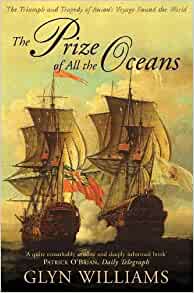 The Prize of All the Oceans, by Glyn Williams
The Prize of All the Oceans, by Glyn Williams
One of those books that makes you wonder why people bother with writing fiction, as this factual account of Commodore Anson’s voyage around the world in 1740-1742 has at least two novels in it: Anson’s own adventures, and the fate of one ship in his little fleet and its few survivors who were shipwrecked on the coast of Chile. (One of the shipwrecked sailors was 17 y.o. Midshipman John Byron, grandfather of the poet and great-grandfather of Ada Lovelace, who went on to have a glowing career and retired as a Vice Admiral, with the soubriquet of ‘Foul Weather Jack’.)
Their Lordships in London conceived the idea of sending an expedition to the south Pacific, “to annoy and dismay the King of Spain” – i.e. capture Spanish ships, in particular the treasure galleon that regularly shuttled between Peru and the Philippines (the ‘Prize’ of the title), and capture Spanish possessions, overthrow their colonial governments and install local Brit-friendly rulers. Even at the planning stage, this proved easier said than done, but once the idea had been had, it was pursued with an almost Theresa-like determination to stick to the plan no matter how untenable. For instance: the fighting force needed to seize and hold the Spanish bastions is calculated as X big; we don’t have X available soldiers; therefore to make up numbers we will pillage pensioners from the Chelsea Hospital – most of whom we already know probably won’t survive the voyage to the Pacific anyway, let alone do any seizing and holding when they get there. But the important thing is, the expedition will leave when we said it will, with (on paper) the right complement of manpower.
Long story short: it was a disaster, right up until the time it wasn’t. Half the expedition’s complement were dead of typhus, starvation and scurvy by the time they reached Cape Horn. Most of the other half died in the next few weeks. They set off with over 1900 men and lost 1400: 4 to enemy action, the rest to accident, starvation or disease. In the worst month, four of the surviving ships between them lost 300 men. Then, when Anson was down to one last ship, HMS Centurion … he only went and captured the galleon, the richest prize ever caught, and returned home a hero.
The commander of the soldiers was one Lt Col Mordaunt Cracherode, who absolutely must have a novel written about him on the basis of his name alone.
